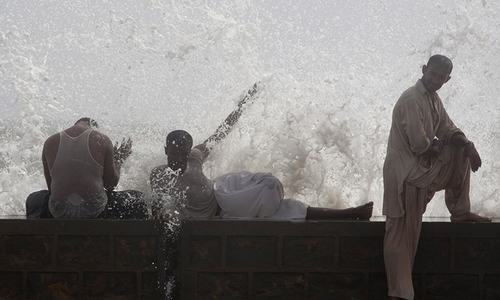ISLAMABAD: The Pakistan Meteorological Department (PMD) is making arrangements beforehand in order to minimise the fallout from freak weather phenomenon, such as extreme heatwaves which experts predict are likely to hit urban centres in the country this summer, partly as a result of El Niño.
Most noteworthy of these measures is that the department has reached an agreement with K-Electric (KE) that is aimed at preventing loss of human lives due to a combination of extreme weather conditions and power breakdowns, PMD Director General Dr Ghulam Rasool told Dawn.com.
A scorching heatwave engulfed Sindh at the beginning of summer last year, claiming the lives of over 1,300 people — with most of the deaths taking place in Karachi.
The crisis had exacerbated due to faulty power grid that resulted in at least four blackouts in the metropolis in July last year.
As part of the agreement, said the official, PMD will notify KE three days in advance about predicted heatwaves, while the areas likely to be affected will also be identified. A public advisory will also be issued so the public can prepare accordingly.
This prediction will enable KE to ensure there is "zero loadshedding in the areas affected by the heatwave during the period the extreme weather lasts", said Rasool, adding that the earliest the onset of a heatwave could be predicted was three days before the event.
KE did not provide confirmation of the agreement despite being contacted by Dawn.com.
Read: Sound byte: ‘Expect more extreme weather this year’
The National Electric Power Regulatory Authority (Nepra) last month slapped a fine of Rs10 million on KE for power crisis in Karachi in June last year that led to deaths of hundreds of people due to heat-related medical complications.
'Close coordination with Sindh govt'
The PMD director said although the weather was likely to fluctuate between 34-36 degrees Celsius this week in Karachi and throughout the rest of April, it was not a cause of concern because sea breeze — an important temperature moderator — is blowing towards the land.
PMD is making efforts to reach a similar agreement with Karachi Water and Sewerage Board so uninterrupted water supply can be made possible during days of heatwave, he added.
The department is in touch with the Sindh government to take measures in view of extremely hot weather, said the official. Its communications department has been mobilised to ensure close coordination with concerned Sindh government departments to avoid an emergency, he said.
Experts last year said high temperatures could also be attributed to the increasing concrete cover and an acute lack of parks and green belts in the city.
Dr Qamar uz Zaman Chaudhry, senior climate change expert, last year said that the government could learn from other countries that faced similar disasters.
"A good example in this regard is Ahmedabad, India, though its plan to protect poor communities from the heatwave was not implemented in other parts of the country," he said. The plan came into effect in the Indian state after around 1,300 people died as a result of a heatwave in 2010.
Authorities in Ahmedabad had established an early-warning system against extreme heatwaves as well as setting up water stations and cooling spaces in public places, malls, temples, etc after the 2010 disaster.















































